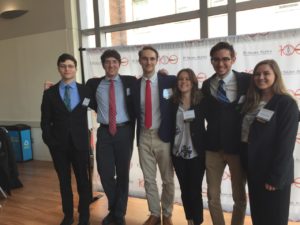
Six UMW political science and international affairs majors presented at the Pi Sigma Alpha national conference in Washington, D.C. From L-R: Jeremy Engel, Kyle Lehmann, Tom Lengel, Lauren Perez, Zachary Handlin, and Rebecca Jacobi.
Six UMW political science and international affairs majors presented their research on February 15 at the Pi Sigma Alpha National Student Research Conference in Washington, D.C. These students, as well as more than 120 of their counterparts from around the nation, were selected to present their research at this national conference based on the importance of their scholarly work. Pi Sigma Alpha, which has more than 700 chapters, is the nation’s only national honor society devoted to excellence in undergraduate political science. The six students selected for presentation this month marks a record high level of participation for the Kappa Upsilon chapter at Mary Washington, and represents one of the highest levels of per-capita participation for any university in the country.
The following Mary Washington students presented research papers:
- Jeremy Engel, a senior political science major from Kensington, Md., “Power Reconsidered: A Contemporary Look at Neustadtian Bargaining.”
- Zachary Handlin, a senior political science major from Chesterfield, Va., “Education about the Constitution in Virginia High Schools.”
- Rebecca Jacobi, a senior double-majoring in international affairs and women’s and gender studies from Vienna, Va., “Victimization of Bosnian Women in Post Conflict Discourse.”
- Kyle Lehmann, a senior international affairs major from Madison, Conn., “Nightmares and Daydreams: Challenges Facing the Chinese Dream.”
- Tom Lengel, a senior double-majoring in international affairs and French from Charlottesville, Va., “Testing Indian Democracy: The Fight for LGBTQ Equality in India.”
- Lauren Perez, a senior double-majoring in political science and communication from Vienna, Va., “The Talk of 2016: Examining Speech Patterns of the Modern Day Electorate.”

